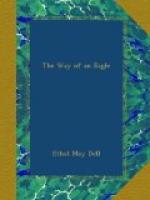“Yes,” breathed Olga, holding her very close.
“Then just take it, dear.” Muriel’s voice was unutterably weary; she seemed to speak with a great effort. “It belongs to Nick. He gave it to me once, long ago, in remembrance of something. I want you to give it back to him, and tell him simply that I prefer to forget.”
Olga took up the ring. Her lips were trembling. “Aren’t you—aren’t you being nice to Nick any more, Muriel?” she asked in a whisper.
Muriel did not answer.
“Not when you promised?” the child urged piteously.
There was silence. Muriel’s face was hidden. Her black hair hung about her like a cloud, veiling her from her friend’s eyes. For a long time she said nothing whatever. Then at last without moving she made reply.
“It’s no use, Olga. I can’t! I can’t! It’s not my doing. It’s his. Oh, I think my heart is broken!” Through the anguish of weeping that followed, Olga clasped her passionately close, frightened, by an intensity of suffering such as she had never seen before and was powerless to alleviate.
She slept with Muriel that night, but, waking in the dawning, just when Muriel had sunk to sleep, she crept out of bed and, with Nick’s ring grasped tightly in her hand, softly stole away.
PART V
CHAPTER XLV
THE VISION
A gorgeous sunset lay in dusky, fading crimson upon the Plains, trailing to darkness in the east. The day had been hot and cloudless, but a faint, chill wind had sprung up with the passing of the sun, and it flitted hither and thither like a wandering spirit over the darkening earth.
Down in the native quarter a tom-tom throbbed, persistent, exasperating as the voice of conscience. Somewhere in the distance a dog barked restlessly, at irregular intervals. And at a point between tom-tom and dog a couple of parrots screeched vociferously.
Over all, the vast Indian night was rushing down on silent, mysterious wings. Crimson merged to grey in the telling, and through the falling dark there shone, detached and wonderful, a single star.
In the little wooden bungalow over against, the water-works a light had been kindled and gleamed out in a red streak across the Plain. Other lights were beginning to flicker also from all points of the compass, save only where a long strip of jungle lay like a blot upon the face of the earth. But the red light burned the steadiest of them all.
It came from the shaded lamp of an Englishman, and beneath it with stubborn, square-jawed determination the Englishman sat at work.
Very steadily his hand moved over the white paper, and the face that was bent above it never varied—a face that still possessed something of the freshness of youth though the set of the lips was firm even to sternness and the line of the chin was hard. He never raised his eyes as he worked except to refer to the notebook at his elbow. The passage of time seemed of no moment to him.




